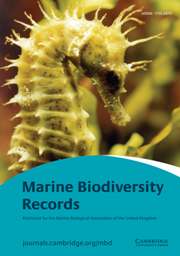Crossref Citations
This article has been cited by the following publications. This list is generated based on data provided by Crossref.
Fernandez-Leborans, Gregorio
Román, Sara
and
Martin, Daniel
2017.
A New Deep-Sea Suctorian-Nematode Epibiosis (Loricophrya-Tricoma) from the Blanes Submarine Canyon (NW Mediterranean).
Microbial Ecology,
Vol. 74,
Issue. 1,
p.
15.
Ansari, K. G. M. T.
and
Bhadury, P.
2017.
Occurrence of epibionts associated with meiofaunal basibionts from the world’s largest mangrove ecosystem, the Sundarbans.
Marine Biodiversity,
Vol. 47,
Issue. 2,
p.
539.
Chatterjee, Tapas
Dovgal, Igor
and
Fernandez-Leborans, Gregorio
2019.
A checklist of suctorian epibiont ciliates (Ciliophora) found on meiobenthic marine nematodes.
Journal of Natural History,
Vol. 53,
Issue. 33-34,
p.
2133.
Ghosh, Moumita
and
Mandal, Sumit
2019.
Living with Nematode: an Epibiont Trematosoma rotunda Associated with Basibiont Desmodora scaldensis from Matla Estuary, Sundarbans, India.
Thalassas: An International Journal of Marine Sciences,
Vol. 35,
Issue. 2,
p.
619.
Baldrighi, Elisa
Dovgal, Igor
Zeppilli, Daniela
Abibulaeva, Alie
Michelet, Claire
Michaud, Emma
Franzo, Annalisa
Grassi, Eleonora
Cesaroni, Lucia
Guidi, Loretta
Balsamo, Maria
Sandulli, Roberto
and
Semprucci, Federica
2020.
The Cost for Biodiversity: Records of Ciliate–Nematode Epibiosis with the Description of Three New Suctorian Species.
Diversity,
Vol. 12,
Issue. 6,
p.
224.
Rostami, Mahsa
Karegar, Akbar
and
Hamzehzarghani, Habiballah
2022.
Biocontrol Potential of the Vorticella sp. Isolated from Vermicompost Against Meloidogyne javanica.
Current Microbiology,
Vol. 79,
Issue. 11,
Lima, Lucas Duarte de
and
Takemoto, Ricardo Massato
2024.
First Record of Epibiont Ciliates (Ciliophora: Suctoria) Associated with Helobdella adiastola Ringuelet, 1972 (Hirudinea: Glossiphoniidae) in Brazil.
Brazilian Archives of Biology and Technology,
Vol. 67,
Issue. ,


